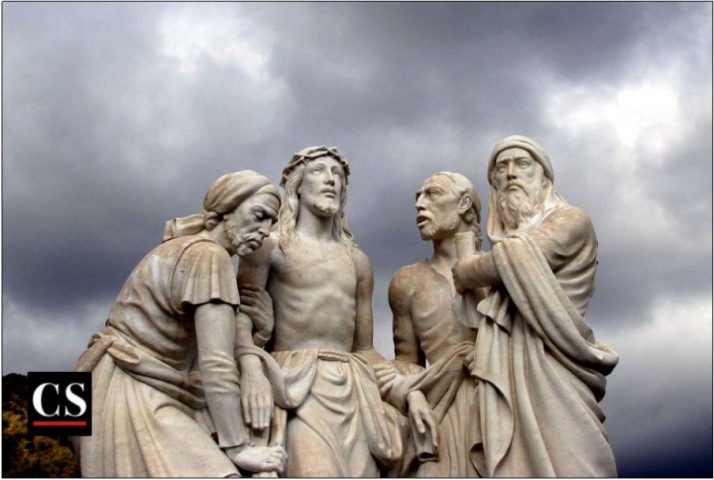Remaining Obedient to God: Understanding the Tools of Our Enemies

Bishop Against Bishop
March 6, 2018
When Catholics Criticize the Pope
March 6, 2018
By Father Nicholas Blackwell O. Carm., Catholic Stand, March 6, AD2018
The Season of Lent can be seen through many different lenses, all correct and important. This diversity makes lent a truly rich season for any Christian willing to open themselves up to the experience it offers. Recently, my mind is on the idea of obedience as an important lens that lent offers us. The life of a Carmelite is rooted in allegiance to Jesus Christ. Allegiance requires one to remain obedient to their Lord. St. John of the Cross reminds us that obedience lived out in love allows one to grow in deeper union with Our Lord and Savior (The Dark Night, Book 1, prologue par. 2).
Thinking about Lent as a time for growth in obedience, which leads one into a deeper relationship with Jesus, reminds us that this life of obedience is not easy. Why? St. Paul wrote:
You were dead through the trespasses and sins in which you once lived, following the course of this world, following the ruler of the power of the air, the spirit that is now at work among those who are disobedient. All of us once lived among them in the passions of our flesh, following the desires of flesh and senses, and we were by nature children of wrath, like everyone else. (Ephesians 2: 1-3)
Our Three Enemies and Their Tools
Paul is telling us about our three enemies: the flesh, the world, and the devil. Each of which is trying to lead us into sin. However, Paul reminds the Ephesians, that they were dead in sin, but no longer are they dead; they all are offered life in Jesus Christ. This offer of life in Jesus Christ is still made to every person to this day and is the animus for the call to obedience.
Yet these enemies have not left the Christian people. All three remain among us. Lent is a time when a light is offered to all Christians, through fasting, almsgiving, and prayer to help the Christian see the impact these enemies are having upon our lives. Just as the obedience of Jesus was tested, we to are called to walk through our own tests; not apart from Jesus, but with Him, for he remains with us always (cf. Matthew 28:20).
The Danger of Sin
What is sin? Sin is disobedience to the will of God (refer to Eph. 2:2 above). Nonetheless, we are called to be like Christ because we are called to be obedient to the Father as He was (Romans 5: 18-21). How can we as a people undergo the trials that these enemies entice us into and remain obedient to God? We must begin by understanding the weapons our enemies use in their battle to ensnare us. What are these weapons? A few that are clearest to us, are known through the work of evil spirits in the New Testament: Confusion, Uncertainty, Temptation, Separation, and Terror.
Confusion
Recall the encounter between Jesus and a man with an evil spirit (Mark 1: 21-26): The spirit speaks three truths, but speaks them in a way to cause confusion among the hearers. The evil spirit identifies a truth about the humanity of Jesus that he is from Nazareth. The evil spirit also calls Jesus the Holy One of God, speaking a truth about his divinity. However, in between these statements that evil spirit asks Jesus a question “Have you come to destroy us?”
The evil spirit wants to connect within the minds of the people in the synagogue that this man (Jesus) is here to destroy them, which is a truth for the evil spirits in the world but not for humanity. Christ came to redeem us as his brothers and sisters. Confusion about who Jesus is can lead a person to give up the gift of faith that has been given to them through and by Christ. St. John of the Cross offers a warning about this work of the devil in The Ascent of Mount Carmel (Book 2, Chapter 21, paragraph 11).
Uncertainty
In his gospel, St. John speaks about an important task of the Holy Spirit in relationship to His presence in the World. The Holy Spirit will come into the world to convict it regarding sin, righteousness, and condemnation (John 16: 8-11). St. John Paul II goes into detail on this passage in his encyclical Dominum et Vivificantem (On the Holy Spirit in the Life of the Church and the World, 1986). This work of conviction by the Spirit reminds us of a tool of the evil one, where the Spirit comes to convict, the devil seeks to spread uncertainty. We see this uncertainty unfolding in the life of St. Peter:
Then Peter took Jesus aside and began to rebuke him, “God forbid, Lord! No such thing shall ever happen to you.” He turned and said to Peter, “Get behind me, Satan! You are an obstacle to me. You are thinking not as God does, but as human beings do.” (Matthew 16: 22-23)
The heart of Peter was twisted by uncertainty about the prediction of Jesus made about his death. That is why Jesus called him Satan, the accuser: because, in Peter’s uncertainty, he accused Jesus of being false about his mission from God. Conviction, as a firmly held belief, comes from the gifts of the Spirit, because conviction is built on the knowledge, wisdom, and understanding given from the Spirit. Also, conviction is acted out through the courage given by the Spirit. The seed of uncertainty weakens the heart and keeps it from relying on its God.
Temptation
Temptation, as it comes from the devil, is about settling for a lesser good that, in turn, draws our attention away from God. Temptation comes through our weakest points, whether of the body or the soul. Christ himself bears witness to this tool of temptation. Christ’s first temptation in the wilderness occurred when his body was hungry. It was at that moment when the devil tempted him to transform a rock into bread; Jesus reminds us, “One does not live by bread alone, but by every word that comes forth from the mouth of God” (Matthew 4:4).
Humans need food to live; food is a good thing, but only having enough earthly food will not satisfy our being. St. John of the Cross warns us “A soul given up to pleasure naturally feels aversion toward the bitterness of self-denial” (The Dark Night, b1. ch. 6. p.7). Christ calls us to pick up our cross and follow him (Matthew 16:24-26). Temptations entice us to set our cross down and distract us from our call to be like Christ.
Separation
Christ formed for himself a body, the Church, which the Holy Spirit gives life to. This truth is an important theme within St. Paul’s first letter to the Corinthians. The devil seeks to separate us from that body, and therefore from our Lord. True, Jesus went off in solitude to pray to the Father; but he was always open to receive anyone that came to him.
Separation, as a tool of the devil, is a means for destroying community and by keeping a person from receiving or being received by others. We see that in the healing of the Gerasene Demoniac (Mark 5:1-20): Here a man, is driven by a legion of demons to cause so many problems that the town had to cast him out because he was a danger, physically and socially. How often do the sins of gossip, envy, and anger separate us from those we love, forcing those we love to keep us at a distance because of the pain we cause them? Not all these sins are works of the evil one, but they are tools he uses to manifest the separation he seeks to cause. If the devil cannot rest in God, why would he want anyone else to do so?
Terror
Finally, we have terror, which is the weakest and foolish of all the devil’s tools, but one the devil still uses. Recall the words of St. Peter “Be sober and vigilant. Your opponent the devil is prowling around like a roaring lion looking for [someone] to devour” (1 Peter 5:8). A roaring lion will never catch his prey. Lions hunt by stealth. That is why I call this a foolish and weak tool. However, for the heart of a young Christian, a beginner on the spiritual journey, the roar of the devil may cause a fear that leads the person to look away from their savior Jesus and walk of the path He gave the person.
However, within his passage, St. Peter already provides us the solution to the terror the devil tries to produce in souls. A soul needs to stay sober and vigilant. Vigilance meaning to stay focused on the path the Lord has called a person to, no matter what noise is occurring in the bush on the sides of its path. Sobriety is the need for a person to remain serious and sensible about their journey on the path they were given by the Lord to walk down.
Conclusion
Are these five tools an exhaustive list that our three enemies use to shape our trials we undergo as we seek to remain obedient to our God? No. These tools are just a few of the clearest examples through the scriptures. These tools are a few of the clearest examples of how our enemies seek to disturb our souls so we will commit sins. St. John of the Cross: “It is not God’s will that a soul be disturbed by anything or suffer trials, for if one suffers trials in the adversities of the world it is because of a weakness in virtue” (The Sayings of Light and Love, #57a).
Our God is a God of love. We can grow and become transformed in that love of God by learning what disturbs us and entices us to disobey our God. Knowing these tools of disturbance helps us to reflect on how they impact us, so we all may grow in deeper self-knowledge of ourselves, strengthening our ability to always say yes to God.
Lent is a time when we are called to reflect on our relationship with God. The call to obedience helps us to see our relationship in a unique way because we are all invited to say yes to God’s love in our lives. How strong is our yes, our obedience to God? Remember, the foundation of obedience is the ability to hear and fully respond to the other. Reflecting on how we have obeyed and disobeyed God helps us to understand how we have listened to Him and responded to His gift of love for us.
God desires the least degree of obedience and submissiveness more than all those services you think of rendering him. (St. John of the Cross, The Sayings of Light and Love #12)
________________________________




